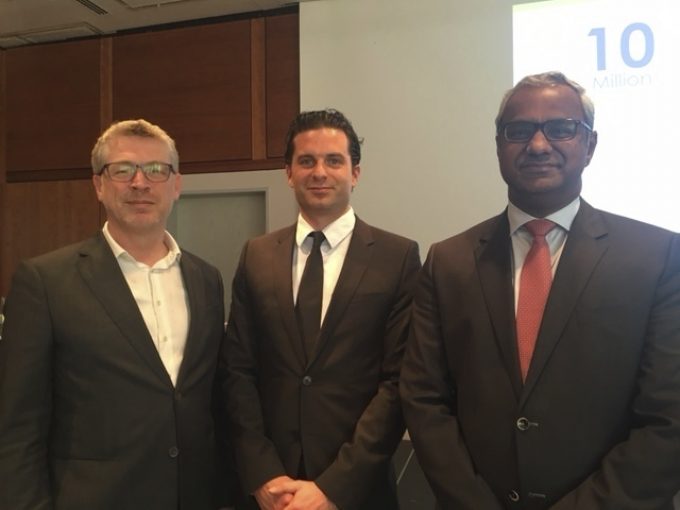Ecommerce drives growth at Liege, as Lufthansa Cargo doubles down on China
European fears of the sharp rise in Chinese ecommerce imports has not stemmed the flood. Liege ...
TFII: SOLID AS USUALMAERSK: WEAKENINGF: FALLING OFF A CLIFFAAPL: 'BOTTLENECK IN MAINLAND CHINA'AAPL: CHINA TRENDSDHL: GROWTH CAPEXR: ANOTHER SOLID DELIVERYMFT: HERE COMES THE FALLDSV: LOOK AT SCHENKER PERFORMANCEUPS: A WAVE OF DOWNGRADES DSV: BARGAIN BINKNX: EARNINGS OUTODFL: RISING AND FALLING AND THEN RISING
TFII: SOLID AS USUALMAERSK: WEAKENINGF: FALLING OFF A CLIFFAAPL: 'BOTTLENECK IN MAINLAND CHINA'AAPL: CHINA TRENDSDHL: GROWTH CAPEXR: ANOTHER SOLID DELIVERYMFT: HERE COMES THE FALLDSV: LOOK AT SCHENKER PERFORMANCEUPS: A WAVE OF DOWNGRADES DSV: BARGAIN BINKNX: EARNINGS OUTODFL: RISING AND FALLING AND THEN RISING

The air freight industry is set to benefit significantly and reap competitive advantage from a restructured Cargo 2000, re-branded yesterday as Cargo iQ.
In a packed – and remarkably positive and excited – room at the World Cargo Symposium in Berlin, the Geneva-based Cargo iQ team announced not only the new name, but significant developments in the way it can measure quality through its Smart Data project.
Noting that its data tracked 10 million airport-to-airport shipments last year, as well as 5.5m door-to-door shipments, an enthusiastic Ariaen Zimmerman, executive director, said a new master operating plan (MOP), created by the industry, had been implemented, allowing Cargo iQ to track all shipments in the same way – and identify errors.
“We can now tell where in the process things go wrong, which we couldn’t do before.”
The new system has clear milestones and route maps, and allows members to easily determine best practice.
“We have a huge advantage in air freight – we have Cargo2000,” said Lucas Kuehner, head of air freight for Panalpina, the day before the re-brand. “Ocean freight has nothing like this, they need to reinvent the wheel every time they re-do an IT system. But in air, we can rely on the processes written down in Cargo2000.
“But the industry has not been using it, and that’s our own fault.”
More of the industry has started to use it, however. Cargo iQ, which has the strapline “visibly better”, announced it already had five new members: Emirates, Brussels Airport, Frankfurt Airport, Vienna Airport and CargoAware.
“It has taken us a long time to evaluate whether to be a part of it,” said Nabil Sultan, head of Emirates SkyCargo. “We’ve come in just at the right time. Cargo iQ is essential for us to offer quality to our customers – some of the work these guys have done is incredible.
“We will use the data to make decisions on using the right products and services to deliver to our customers.”
Previous ‘industry associates’ – such as handlers, can now become full members – “an important step to show the outside world that it’s a collaboration,” said Swissport’s Daniel Setz.
“This is a page-turner,” said Kester Meijer of KLM, a carrier which has consistently focused on quality. “At KLM we want to reach the next level, and we now have smart data to get a shared version of the truth.
“It is very clear where to improve using smart data and the MOP. ICAO and the World Customs Organisation have struggled to understand our business model. But with this MOP, there are clear milestones which mean they can grasp what we struggle with. This is where we can gain insight into trade facilitation.”
Mr Zimmerman added that Cargo iQ was also working with the World Bank to look at how different countries perform.
“It’s about stepping out from an organisation of 82 members into an organisation that wants to mean more to the world,” he said. “And we are a safe platform for the industry to work together, shielded from legal risk. Collaboration leads to quality.”
Members will be able to see how they compare against competitors, by transit times, tradelanes and other measures, share the information with customers and use it to improve quality at any weak points.
Nick Platts, head of cargo at Heathrow Airport, said it too was considering membership.
“We want to understand the benefits to airports first – but our aspiration of improving quality across the supply chain is shared, and we will keep talking with potential partners. This is a refreshing change.”
Max Sauberschwarz, chairman of the Cargo iQ board and head of air logistics at Kuehne + Nagel, added: “I am pretty excited and happy. I am looking forward to building a positive momentum for the entire industry.”
Comment on this article